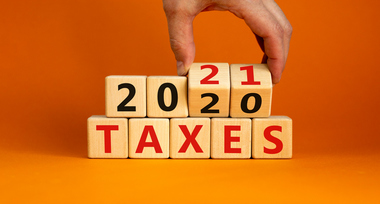
Tax Changes to Think About in 2022
 The 2021 tax landscape was filled with headlines about new, possible, and pending legislation. When the year ended, taxpayers were left with many questions about what taxes would look like in 2022. For now, the Build Back Better Act is on hold, and many provisions of the Tax Cuts and Jobs Act of 2017 expired, including some that may be extended retroactively. The following article lists some of the more far-reaching of these provisions, but keep in mind that it is not a definitive list.
The 2021 tax landscape was filled with headlines about new, possible, and pending legislation. When the year ended, taxpayers were left with many questions about what taxes would look like in 2022. For now, the Build Back Better Act is on hold, and many provisions of the Tax Cuts and Jobs Act of 2017 expired, including some that may be extended retroactively. The following article lists some of the more far-reaching of these provisions, but keep in mind that it is not a definitive list.
New and expiring provisions and other rules
Congress did not pass any tax extenders at the end of 2021. As a result, some changes that were enacted by the TCJA expired Dec. 31, 2021. While Congress may act to extend them retroactively, as of now, businesses need to consider the following:
- Research and development expenditures: Effective for amounts paid or incurred during tax years beginning after Dec. 31, 2021, taxpayers must amortize their R&D expenditures, including those that are related to software development, over five years or longer. The amortization period begins at the midpoint of the tax year in which the expenditures were paid or incurred, even if the taxpayer has not brought in any income from the expenditures. Additionally, R&D expenditures that are attributable to foreign research must be amortized over 15 years.
- Carried interest charges: Commonly known as carried interest, the three-year minimum holding period for capital gain treatment of the sale or exchange of an applicable partnership interest will affect APIs acquired on or after Jan. 1, 2018. The IRS posted a list of frequently asked questions in November 2021 to aid taxpayers and pass-through entities in understanding the reporting and filing requirements under the final regulations. The Association of International Certified Public Accountants also proposed further clarifications and other suggestions with respect to the FAQs in December 2021. Taxpayers who are affected by this change should seek professional guidance concerning how these charges should be reported.
- Exempt organizations executive compensation: An excise tax equal to the corporate rate of 21% applies to annual remuneration over $1 million to certain executives and other highly paid employees of applicable tax-exempt organizations. The tax also applies to excess parachute payments.
- Expired provisions: The provisions that expired Dec. 31, 2021, include:
- The child care tax credit.
- A number of energy and fuel tax credits, such as credit for qualified fuel cell motor vehicles and the credit for the construction of new energy-efficient homes.
- The provision affecting the computation of adjusted taxable income for purposes of the limitation on business interest.
- The provision for the treatment of charitable contributions deduction for nonitemizers.
- The provision for the treatment of premiums for certain qualified mortgage insurance as qualified residence interest.
Provisions of the current version of the Build Back Better Act to consider
The BBB is still being stalled by Congress, but the version passed by the House on Nov. 19, 2021, contains a number of tax provisions. While the specifics may change, it seems likely that the following areas will be affected if and when the bill becomes law:
- SALT taxes: The $10,000 cap on deductions for state and local taxes through 2026 has been debated ever since it was enacted under the Tax Cuts and Jobs Act of 2017. The BBB proposes to increase the $10,000 cap for SALT deductions enacted under the Tax Cuts and Jobs Act of 2017 to $80,000 with certain income thresholds.
- Net investment income tax: Pass-through entities, such as S corps and LLCs, may be affected by the expansion of the NIIT. If passed, business owners of pass-through entities will need to decide how they accept their funds.
- Minimum tax on book income: This provision imposes a 15% minimum tax on corporations with book income of more than $1 billion. This tax closes a loophole for large businesses, like Amazon and Google, that may report different amounts for book purposes and tax purposes.
- Roth IRAs and backdoor Roth IRAs: Backdoor Roth IRAs allow taxpayers to sidestep the income limits regarding who can contribute to a Roth IRA by contributing money to a traditional IRA and then converting it into a Roth IRA. The strategy, which mostly affects high-income earners, allows the funds transferred to the Roth IRA from the traditional IRA to both grow and be withdrawn tax-free.
As of the present time, the BBB will not only eliminate this strategy for all taxpayers, but it will institute withdrawal requirements for taxpayers with balances of $10 million or more across their defined contribution retirement accounts as well. Further withdrawal requirements would be established for taxpayers with combined balances of over $20 million.
- High-income surtax: Currently, BBB adds a 5% surtax on modified adjusted gross income over $10 million and an additional 3% tax on modified adjusted gross income over $25 million.



